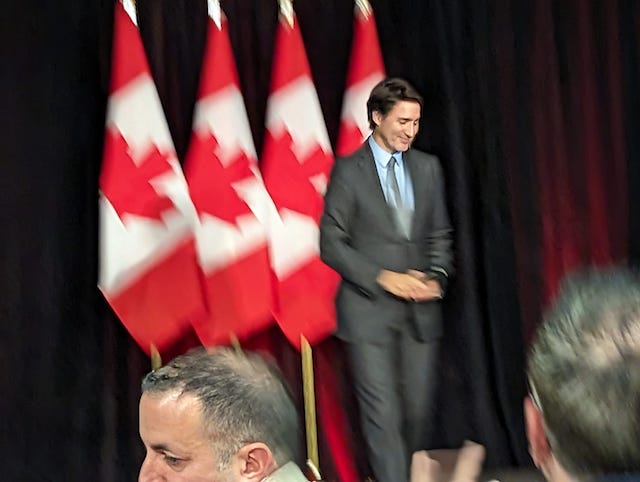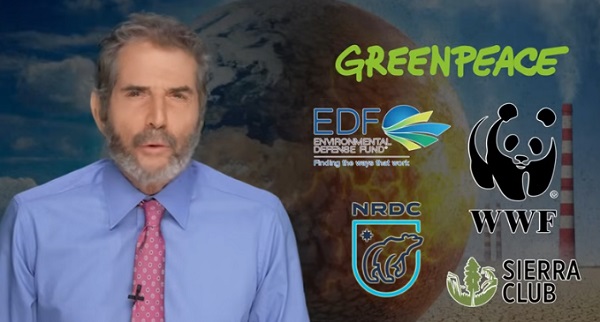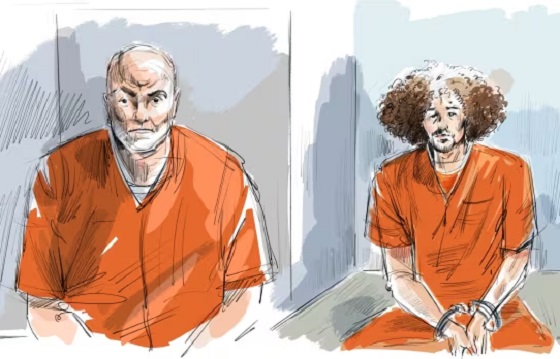Opinion
Tuesday-night Trudeau

Justin Trudeau at Gatineau Airport, Oct 24 – Photo by PW
Posted with permission from Paul Wells
Justin Trudeau in a hangar, before the comeback, if there’s going to be one
If Justin Trudeau’s historic comeback happens, it will start sometime after Tuesday night, when he spoke to a Liberal Party of Canada fundraiser at the one-runway Gatineau Airport, 21 minutes’ drive from Rideau Cottage on the Quebec side of the river.
The prime minister is two months short of his 52nd birthday. Brian Mulroney was not quite 54 when he became the youngest undefeated prime minister, so far, to announce his retirement from politics. This is the sort of week when I look up numbers like that.
The polls since summer haven’t been kind to the Liberals. I have readers who get cross with me when I mention polls, but I cover the most polling-obsessed government in Canada’s history, and I must decline requests to unilaterally disarm.
Trudeau and his ministers do fundraisers all the time, as do the leaders and prominent MPs in other parties. The only difference on Tuesday was that I went to watch. After some embarrassing early headlines about fundraisers soon after the 2015 election, the Liberal Party changed its rules to increase transparency in fundraising. Now reporters get advance notice whenever Trudeau will be speaking at a fundraiser. I wanted to see what Trudeau says at such things these days, precisely because they’re routine events. Hearing how the prime minister talks to friendlies on a Tuesday night near home was, perhaps, the closest I could get to hearing how he talks to himself.
This event was a fundraiser for Gatineau MP Steven MacKinnon, a former Liberal Party national director who is serving as the government’s house leader while Karina Gould is on maternity leave. Two cabinet ministers were on hand too, Jean-Yves Duclos and Anita Anand. An organizer told the audience he’d been asked to get a smallish crowd out, “a good 50 or so;” since 67 people bought tickets, he was pretty pleased. The party had announced a ticket price up to $1,500. The crowd was of the sort that routinely gets described as overwhelmingly white and male when it’s a Conservative event, which means it was overwhelmingly white and male, but Liberal.
Trudeau spoke for twelve minutes. He opened by saying nice things about MacKinnon and thanked the two cabinet ministers. Poor Duclos thought he was just out to socialize, Trudeau joked, but Duclos is the minister of public services and procurement, “and around here we talk about a bridge.” Gales of laughter from the crowd. The riding association guy had also mentioned a bridge. There has been endless talk about a sixth bridge between Ottawa and Gatineau; neighbours near the various possible routes are leery, but a lot of people hope a new bridge would improve traffic flow, which often includes bumper-to-bumper heavy trucks on ordinary streets through the middle of Ottawa. A lot of the people who want the bridge the most run businesses. Judging from the PM’s choice of comic patter, they won’t have to wait long.
Trudeau thanked the crowd for coming out. “I know very well that everyone has plenty of choices for the various activities they could undertake on a Tuesday night in the month of October,” he said. This may have flattered the selection of fun activities in Gatineau on a Tuesday.
“You chose to come participate in a democratic event,” Trudeau continued. This was an instinct he could only applaud: “We know very well these days that it’s not always very motivating to get involved in politics. To raise your hand and say, ‘No, no, no, I want to participate in our democracy in an active and involved way. To take part in the conversations we’re having as a country in these difficult moments.’”
Trudeau contrasted this positive spirit with what certain other people, so far unnamed, like to do. “It’s very easy to point our finger at politicians, to complain about inflation or the pandemic or interest rates or labour shortages or housing or all these issues. It’s very easy, and many people decide to turn toward anger, anxiety, fear or division. Because it really pays over the short term, in politics, to rely on fear and division. But it’s so much more important to have a responsible, sensible approach, anchored in shared values. To try to bring us together rather than to divide us in an attempt to win a few points in the polls.”
One sensed an emerging central theme of contrast. “Your choice to come tonight to this Liberal event is enormously touching to me,” Trudeau said. “Because for eight years now, we’ve tried to be a government that stayed rooted in real things. In facts. In shared values. We bring people together rather than divide them for strategic reasons.”
Not only does his government, in his telling, think like good people, it does things good people will like.
“We manage to deliver for people. Even in extremely difficult moments like the ones we’re living through. People are struggling, because of the global context, extremely complex geopolitics that have a direct impact on pocketbooks, on groceries and rent. We have an important role to play as a government, to respond to today’s needs. That’s why we’ve made investments to help people pay their bills, to increase competition among the big grocers. We’re there to provide more daycare spaces. We’re there to help with dental care. We’re there to help with the Canada Child Benefit, which has lifted half a million children out of poverty in recent years. We’re there to create economic growth even as we fight against climate change.”
His audience for the night being mostly Quebecers and, as far as I could tell, mostly in business, the Liberal leader refined his course of general flattery to one of specific business-oriented flattery.
“I’m very proud of what we’ve been able to deliver in Quebec: Northvolt, Rio Tinto, REM… These are investments that show how much — here in Quebec where we’ve always understood that environmental protection and economic growth go together — everyone can make progress together.”
This was a pretty upbeat message, as partisan messages often are — we have the right ideas and the right results, and the other team is trying to wreck it all — but here again, as when he lamented how “not very motivating” the political life can be, Trudeau introduced a distinctly mournful note.
“As usual, it’s a bigger challenge to get this message out in the rest of Canada,” he said. At the risk of talking about polls, I couldn’t help thinking Trudeau was referring to recent pee oh ell ells that show Quebec as the only part of the country where his Liberals are in the lead. Despite big federal spending on Volkswagen ($13 billion) and Stellantis (probably more), the clean green future seems not to tempt a lot of Canadians. “It still feels far off, because the day-to-day is still difficult for many Canadians,” he said. “But we know very well that a society and a future are built step by step.…When we stay optimistic, when we’re reasonable, everything becomes possible in the future.”
This, he said, summing up, was “the political debate we’re having now…. Within two years — probably in two years — we’ll have elections.” That’s when people will get a chance to choose directions.
“Will we go back to the Conservative ways of trickle-down, cuts to social programs, advantages for the well-off in the hopes that they’ll eventually give everyone opportunity? It’s never worked and it won’t work better now.” Or would voters stick with the government Trudeau sees in the mirror? “We’re going to stay responsible but we’re going to keep investing,” he said.
Only now, at the end of his remarks, did Trudeau switch from French to English. “It’s always an incredible pleasure to spend time with people who are dedicated every day to building stronger communities and a stronger country.” And that was the end of that. The applause lasted for sixteen seconds. PMO staff led reporters out of the room — our access ends when the big guy stops talking.

A few observations on all this.
First, I’m struck by the way Trudeau narrowed down his expectation of election timing: “Within two years — probably in two years.” Probably anyone in a position of responsibility in any party would say an election could come any time, it’s wise to be ready, and so on. But in Trudeau’s mind, the supply and confidence agreement with the NDP seems likely to hold. He is not in a rush. Judgment Day isn’t until 2025.
Second, if he’s getting any advice to hit pause on carbon taxes, he sure doesn’t sound like he’s getting ready to take the advice. The heart of his case for himself is the notion that you can have clean energy and a thriving economy, and indeed that the latter depends on the former. That argument doesn’t require a carbon tax — theoretically, if you subsidize enough battery plants gasoline will become obsolete — but nothing in Trudeau’s fundraiser stump speech sounded like he was laying the predicate for a major retreat on carbon taxes.
BIG HONKING UPDATE, MINUTES LATER:
The feds have made a large announcement that shows the risks in making predictions. I quote:
“The Prime Minister, Justin Trudeau, today announced the government is moving ahead with doubling the pollution price rebate (Climate Action Incentive Payment) rural top-up rate, increasing it from 10 to 20 per cent of the baseline amount starting in April 2024. People who live in rural communities face unique realities, and this measure would help put even more money back in the pockets of families dealing with higher energy costs because they live outside a large city.
“Given the pressures faced by households and small businesses that use oil heating, the Prime Minister also announced that the government is moving ahead with a temporary, three-year pause to the federal price on pollution (fuel charge) on deliveries of heating oil in all jurisdictions where the federal fuel charge is in effect. This pause would begin 14 days from today. While the fuel charge is already returned to consumers through the pollution price rebate, this temporary pause would save a household that uses heating oil $250 at the current rate, on average, while the federal government works with provinces to roll out heat pumps and phase out oil for heating over the longer term.”
Third, and more generally, the case Trudeau was building was for more of the same. “It still feels far off, because the day-to-day is still difficult for many Canadians,” he said, which is how you talk when you’re hoping your ship comes in before people get a chance to pass judgment.
Incidentally, here I think it’s only fair to point out there’s been recent progress on files I often point to as evidence that Liberal plans never pan out. The Canada Growth Fund, the object of this newsletter’s first post, made its first investment this week, a $90 million equity play in a Calgary geothermal energy company. The Canada-US Energy Transformation Task Force held a second meeting. Maybe two years of process news like that will add up to an electorate that’s excited about Canada’s energy transformation. I mean, it’s possible.
Most of all, I was struck by how “more of the same” had better work for the Liberals, because if the boss has a better idea, he’s hiding it well. A leader who once ran on cost-of-living issues…
… is now running on the clean-energy future that feels tantalizingly out of reach, and lamenting his opponent’s insistence on running on cost-of-living issues. His best hunch about timing is that he has no reason to rush, and his best assessment of his work to date is that he needs to do more of it.
Liberals who feel more of a sense of urgency, futility or wasted energy will just have to get on board, I guess. The leader’s not for turning.
Subscribe to Paul Wells
Politics and culture as though they mattered.
John Stossel
The Green Industrial Complex: Power, Panic, and Profits

From StosselTV
Media portray environmental groups as the underdog. In reality, they’re the big guys, and today they’re rolling in money.
What’s worse is how they use it.
First, they peddle scares. They say polar bears are disappearing. They aren’t. They claim bees are dying off. Also not true. They spread these lies to get MORE money.
“Hysteria generates donations,” explains science writer Jon Entine. “The oxygen for these organizations is money donated by people who think they’re doing good.” It’s why Big E now receives billions in donations.
It’s bad enough that they lie to us to get paid. But they also use their money to block progress. One group boasts, “In the past year our legal team has stopped thousands of miles of fossil fuel pipelines and dozens of large power plants.”
They even oppose solar and wind farms. “It’s a shame,” argues Cato Institute’s Travis Fischer, “When I think about what America could be … we could be so much more prosperous than we are.”
Our video covers more ways Big E blocks progress.
After 40+ years of reporting, I now understand the importance of limited government and personal freedom.
——————————————
Libertarian journalist John Stossel created Stossel TV to explain liberty and free markets to young people.
Prior to Stossel TV he hosted a show on Fox Business and co-anchored ABC’s primetime newsmagazine show, 20/20. Stossel’s economic programs have been adapted into teaching kits by a non-profit organization, “Stossel in the Classroom.”
High school teachers in American public schools now use the videos to help educate their students on economics and economic freedom. They are seen by more than 12 million students every year.
Stossel has received 19 Emmy Awards and has been honored five times for excellence in consumer reporting by the National Press Club.
Other honors include the George Polk Award for Outstanding Local Reporting and the George Foster Peabody Award.
———
To make sure you receive the weekly video from Stossel TV, sign up here: https://johnstossel.activehosted.com/f/1
—— —
Fraser Institute
Democracy waning in Canada due to federal policies

From the Fraser Institute
By Lydia Miljan
In How Democracies Die, Harvard political scientists Steven Levitsky and Daniel Ziblatt argue that while some democracies collapse due to external threats, many more self-destruct from within. Democratic backsliding often occurs not through dramatic coups but through the gradual erosion of institutions by elected leaders—presidents or prime ministers—who subvert the very system that brought them to power. Sometimes this process is swift, as in Germany in 1933, but more often it unfolds slowly and almost imperceptibly.
The book was written during Donald Trump’s first presidential term, when the authors expressed concern about his disregard for democratic norms. Drawing on Juan Linz’s 1978 work The Breakdown of Democratic Regimes, Levitsky and Ziblatt identified several warning signs of democratic decline in Trump’s leadership: rejection of democratic rules, denial of the legitimacy of political opponents, tolerance or encouragement of violence, and a willingness to restrict dissent including criticism from the media.
While Trump is an easy target for such critiques, Levitsky and Ziblatt’s broader thesis is that no democracy is immune to these threats. Could Canada be at risk of democratic decline? In light of developments over the past decade, perhaps.
Consider, for example, the state of free speech and government criticism. The previous Liberal government under Justin Trudeau was notably effective at cultivating a favourable media environment. Following the 2015 election, the media enjoyed a prolonged honeymoon period, often focusing on the prime minister’s image and “sunny ways.” After the 2019 election, which resulted in a minority government, the strategy shifted toward direct financial support. Citing pandemic-related revenue losses, the government introduced “temporary” subsidies for media organizations. These programs have since become permanent and costly, with $325 million allocated for 2024/25. During the 2025 election campaign, Mark Carney pledged to increase this by an additional $150 million.
Beyond the sheer scale of these subsidies, there’s growing concern that legacy media outlets—now financially dependent on government support—may struggle to maintain objectivity, particularly during national elections. This dependency risks undermining the media’s role as a watchdog of democracy.
Second, on April 27, 2023, the Trudeau government passed Bill C-11, an update to the Broadcasting Act that extends CRTC regulation to digital content. While individual social media users and podcasters are technically exempt, the law allows the CRTC to regulate platforms that host content from traditional broadcasters and streaming services—raising concerns about indirect censorship. This move further restricted freedom of speech in Canada.
Third, the government’s invocation of the Emergencies Act to end the Freedom Convoy protest in Ottawa was ruled unconstitutional by Federal Court Justice Richard Mosley who found that the government had not met the legal threshold for such extraordinary powers. The same day of the ruling the government announced it would appeal the 200-page decision, doubling down on its justification for invoking the Act.
In addition to these concerns, federal government program spending has grown significantly—from 12.8 per cent of GDP in 2014/15 to a projected 16.2 per cent in 2023/24—indicating that the government is consuming an increasing share of the country’s resources.
Finally, Bill C-5, the One Canadian Economy Act, which became law on June 26, grants the federal cabinet—and effectively the prime minister—the power to override existing laws and regulations for projects deemed in the “national interest.” The bill’s vague language leaves the definition of “national interest” open to broad interpretation, giving the executive branch unprecedented authority to micromanage major projects.
Individually, these developments may appear justifiable or benign. Taken together, they suggest a troubling pattern—a gradual erosion of democratic norms and institutions in Canada.
-

 Alberta12 hours ago
Alberta12 hours agoMedian workers in Alberta could receive 72% more under Alberta Pension Plan compared to Canada Pension Plan
-

 Uncategorized2 days ago
Uncategorized2 days agoCNN’s Shock Climate Polling Data Reinforces Trump’s Energy Agenda
-

 Opinion2 days ago
Opinion2 days agoPreston Manning: Three Wise Men from the East, Again
-

 COVID-191 day ago
COVID-191 day agoTrump DOJ dismisses charges against doctor who issued fake COVID passports
-

 Business1 day ago
Business1 day agoMark Carney’s Fiscal Fantasy Will Bankrupt Canada
-

 Energy1 day ago
Energy1 day agoActivists using the courts in attempt to hijack energy policy
-

 Alberta20 hours ago
Alberta20 hours agoAlberta ban on men in women’s sports doesn’t apply to athletes from other provinces
-

 National20 hours ago
National20 hours agoCanada’s immigration office admits it failed to check suspected terrorists’ background








